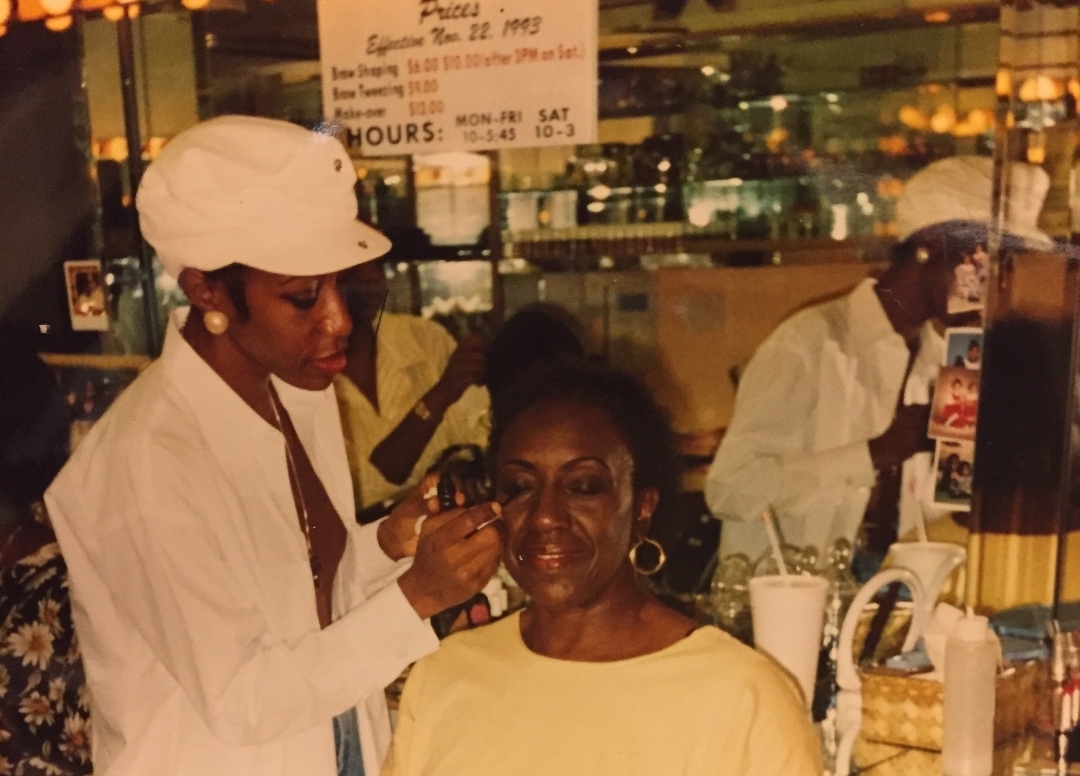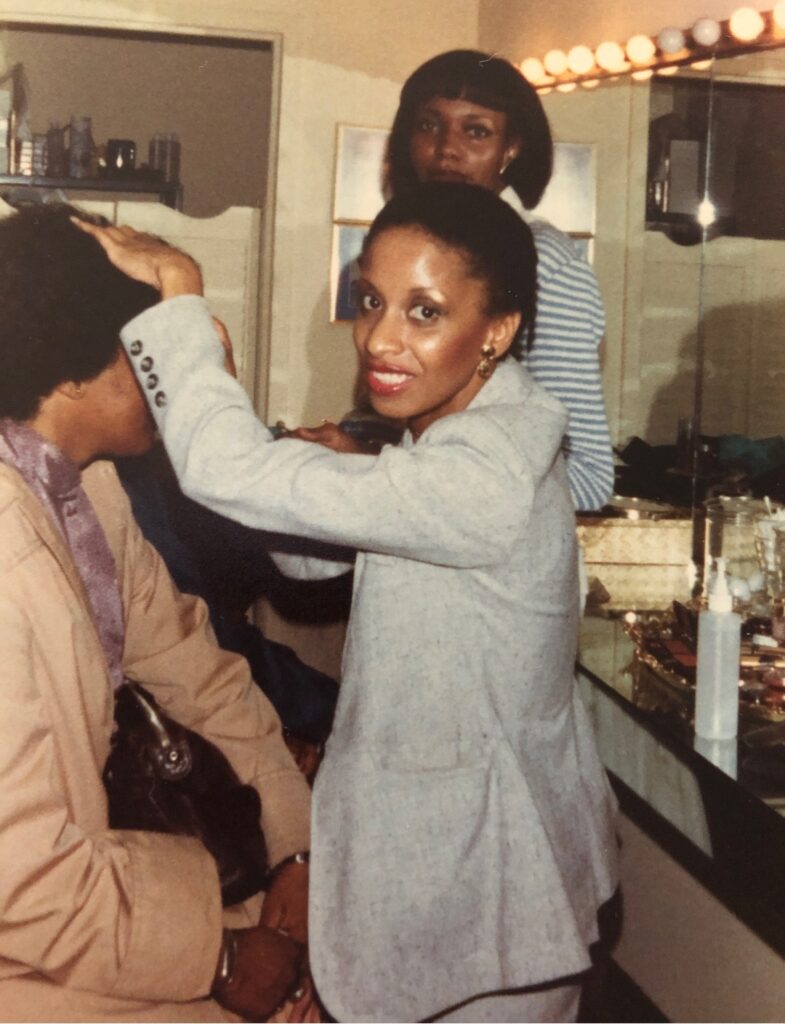The Churn
An ode to West End Mall
Butter ATLNovember 17, 2020

This story was produced by Canopy Atlanta, a new community-led journalism project. West End community members helped choose and produce Canopy’s just-released West End issue.
Dendera Cosmetics Studio has had opportunities to leave the West End Mall for bigger spaces elsewhere, but my mom and aunt always felt good about their lil’ place at 822 Oak Street. It was home. They loved their customers. And their customers loved them right back. Ladies in business suits would sprint in for an eyebrow arch on their lunch breaks. Others in house shoes sat around for hours just to chat. Chris Tucker’s mom always stopped by for a makeover before one of her son’s movie premieres. Much like the mall itself, anyone and everyone has come to Dendera.
Hell, one time somebody from Toni Braxton’s team called and asked if their client could get her makeup done for an event. It was a weekend, and the place was packed. They didn’t take reservations back then. My mom said Ms. Braxton was more than welcome to come by, but she’d have to wait in line like everyone else. It didn’t matter how many Grammys you had—this place never played favorites. Toni never showed up.
But that’s the thing about the West End Mall: Even without Billboard-topping singers, the mall had lots of characters and plenty of character. If you were cool with people like mall regular Johnny walking around its corridors all day in a winter coat — in any season — or the smell of lemon pepper wings wafting from American Deli, it felt like a second home.
I should know. I grew up there.
My late mother, Melinda Williams, started her quaint makeup salon in the mall in 1980, nearly 10 years after the mall opened its doors. Thanks to her creative genius, the hard work of her sister and business partner, Celestine Beverly, and the grace of God, the shop is still thriving today.
My mom envisioned a haven where Black women could not only go for a beautiful face, but for fellowship, friendly conversation, or a few nuggets of life advice. Few other makeup salons in the city gave African American women that kind of attention. (MAC Cosmetics and Fenty didn’t exist then.)
“One of the objectives that we had in developing the mall was to get the community involved,” said Richard Dent, then president of HT Group, the company that owned the West End Mall and other Atlanta-area shopping centers from the 1970s through the ’90s. “We tried to get more Black-owned businesses in the West End Mall. We felt that was necessary to make it successful. With your mom and aunt, they were at [a shop] in Peachtree Center. I went down there and told them, ‘Y’all need to be over to the West End Mall.’”

I know Mr. Dent and Cletta Rowden, the mall’s current manager, pretty well. I worked at Dendera’s checkout counter just about every weekend in the late ’90s and early ’00s. I’d drop off the monthly lease checks to the main office. There were a couple of winter breaks where I even worked at the mall’s gift-wrapping station. (Fun fact: In the ’70s, the West End Mall became the first mall in Atlanta to have a Black Santa.)
But it didn’t matter if it was a holiday, a Saturday health fair, or a random Tuesday—West End always had an air of excitement about it. It’s like when everyone is over at your grandma’s house: it might be a little loud at times, but everything you need is there, and it just feels comfortable.
When asked about the things that make the mall so special, my Aunt Celeste replied, “it’s the uniqueness of the people … the diversity of brown people. The hair salons, the cosmetics salons, the food. It’s the camaraderie of being around African American people.”
The mall currently lacks many big-name stores, but there was a time when Sears anchored the mall. I remember Revco drugstore, a RadioShack, and a Bronner Brothers hair salon, too. But it wasn’t all about the bigger names; really, it was the mom-and-pop shops that really made the mall feel magical to me. At one time, you could find everything from dapper suits and soups to Sonia Sanchez books and sculptured nails. One of them, a small restaurant called Fish in the Pocket, is still around. The next time you’re in the area, grab a fryer-fresh Fish Supreme sandwich and a peach punch. Thank me later.
“My mom envisioned a haven where Black women could not only go for a beautiful face, but for fellowship, friendly conversation, or a few nuggets of life advice.”
“[The mall is] in the community, where people that live around that way can just walk to it,” said Wilma Terrell, the mall’s marketing director from 1991 to 1998. “They don’t have to drive. They don’t have to catch the bus. It has that informal atmosphere. It’s got this community feel, and it sits right in the hub of a historical part of the city.”
That sense of community loudly resonated in Dendera. Sisters routinely came in together for eyebrow arches. Husbands treated their wives to makeovers. I even knew of a few mothers who brought in daughters who, in turn, brought their own teenage daughters in for services. Customers gave me birthday gifts. Some attended my family functions. Love filled the shop on a daily basis.
“I like the warm feeling when I first come through the door,” said Mariea Walker, one of Dendera’s long-time patrons. “I feel the warmth from their hearts, like they love what they do. And I love what they do to me.”
Oh, and there’s one other customer I have to mention. Zena Scott got her eyebrows shaped just about every weekend. One summer day in 2006, this cute young lady left behind a book—something to do with freelance writing—by mistake. I had no clue she was an aspiring journalist. Since I was already a “professional writer” with a local publication called INsite, I saw the whole thing as a sign from above. The next week, as she was paying for her service, she asked me if I had seen the book. I used the opportunity to break the ice. I eventually asked her out. She said yes. A year later, I asked her to marry me. She said yes again.

Of course, it hasn’t been all rosy here. We’ve had some tough financial patches at Dendera. The mall’s halls have had their share of fistfights, and I’ve seen a few ugly car accidents in the parking lot (like the time an 18-wheeler made too sharp a turn out of the parking lot and completely shredded the side of a car).
I’ll never forget the December afternoon when we were having a family event in the mall’s community room, and I noticed for the first time that my mom needed assistance to sit in a chair. She’d be diagnosed with cancer five months later.
But you have to take the good with the bad, smile with the sad. And that’s precisely what I’ve done with every memory I have of the West End Mall.
Frustratingly, no one really knows what the future holds for this place. The stalled redevelopment plan and ownership rumors make for interesting headlines, but it’s serious business for my family still working at Dendera today. It’s our livelihood. We’ve laughed with tenants and cried with customers. It’s our lives, too.
The other day, my Aunt Celeste told me that she’d like to see more higher-end residences and restaurants around the mall. I wouldn’t mind that at all. The community deserves it. But I need for the West End Mall owners—current or future—to understand that, for every trendy Mediterranean grill that comes, there needs to be a neighboring stall filled with the same Egyptian Musk oils we’ve known for so long. It would be heartbreaking for new owners looking toward the mall’s future to come in and forget about Dendera Cosmetics and other small businesses that made its past so colorful.
Don’t get me wrong, though. A fresh exterior and a few new coats of paint would be appreciated. Lord knows my family understands the power of a good makeover.

